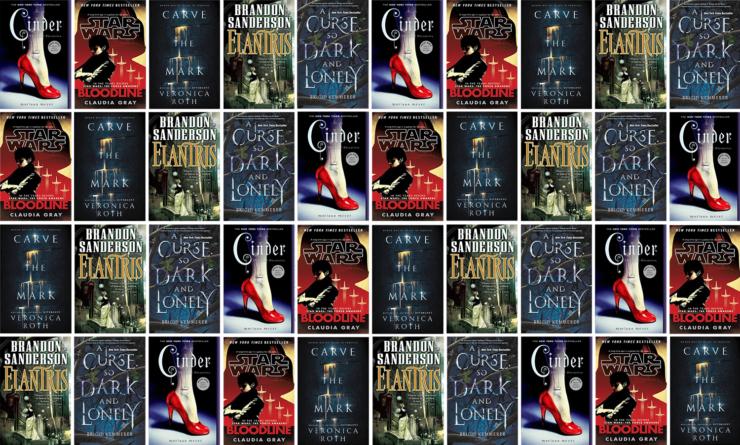As someone with a chronic illness, reading sci-fi and fantasy books that feature characters with disabilities has had a huge impact on me. It’s valuable to see myself as a hero and not just a character on the sidelines who’s too “broken” to go on an adventure. I don’t exist to inspire other people, I’m not useless until I’m healed, and I don’t have to overcome my disability to be worth something. I want the fiction I read to embrace diversity and include characters who are learning to deal with their conditions—just like me.
Each of the books on this list includes a character who has chronic pain or a disability, who plays a significant role in the story. I appreciate how these characters all wrestle with their conditions and learn to value themselves—despite others telling them they’re useless.
Elantris by Brandon Sanderson
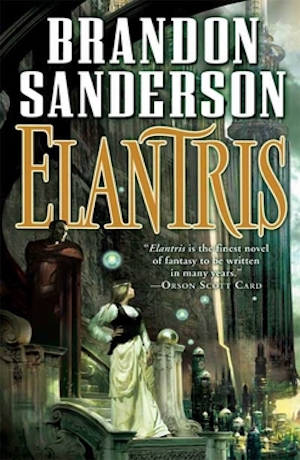
In Sanderson’s first published book, anyone in Arelon has the potential to turn into an Elantrian. Because magic. While this used to be a celebratory event (Elantrians were long-lived, immortal beings with healing powers), it’s now a curse. Ten years ago, the magic of Elantris was destroyed, the city sealed off, and anyone who turns into an Elantrian is thrown into the city and abandoned. They’re left there forever to deal with bodies that are immortal but unable to heal at all—if an Elantrian injures themselves, that pain never goes away. Over time, injuries, even minor ones like stubbed toes or paper cuts, accumulate and drive the Elantrians mad.
Prince Raoden is transformed into an Elantrian at the beginning of the story. Cast out into Elantris, he becomes intimately familiar with chronic pain. Raoden inspires other Elantrians, not simply by existing, but by encouraging them to focus on other things instead of their suffering and helping them cope. Then, as his own injuries accumulate, he has to learn to cope himself.
A Curse so Dark and Lonely by Brigid Kemmerer
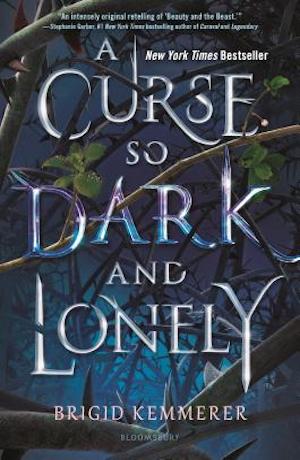
In this twist on Beauty and the Beast, protagonist Harper has cerebral palsy. It definitely doesn’t stop her from being this story’s hero, and she refuses to be put into the role of damsel-in-distress or Stockholm syndrome victim as the narrative unfolds. As Harper learns more about the magical land she’s been transported to and the prince’s curse, she stubbornly fights back and puts her life on the line for the sake of innocents. She falls in love with the fantasy world and the people in it, realizing she can be a positive force for good there.
While there is opportunity here for her condition to cause her a few more problems than it does (it mostly manifests as a limp), I appreciate how her self-consciousness transforms into confidence. People in her previous life constantly undervalued her and considered her worthless; this message has been sent to her so often that she had started believing it herself. In this new world, she embraces her true value, makes friends who don’t view her as a liability, and sees her condition as a part of her that she doesn’t need to change.
Star Wars: Bloodline by Claudia Gray
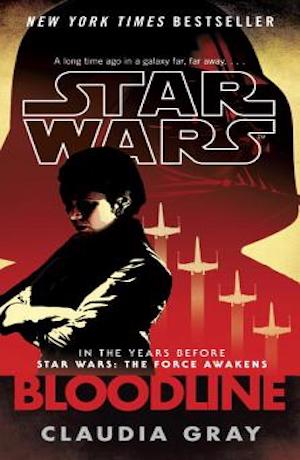
Set twenty years after Return of the Jedi and a few years before The Force Awakens, Bloodline follows Senator Leia Organa and the events that lead to her forming the Resistance. Greer Sonnel is Leia’s assistant and accompanies her on these adventures. Greer’s backstory is unpacked throughout the novel, and we learn that she trained to be a starfighter pilot before she mysteriously had to quit flying. Greer has Bloodburn Syndrome, a rare, chronic illness that affects starship pilots due to space travel, causing fevers (and sometimes death).
Greer hides her condition from most people because she doesn’t want to be treated differently. She has learned to manage her illness but has had to deal with crushed dreams due to a condition she can’t control. She obviously loves flying and grieves the loss. Despite this, she pushes herself to do what she can within her limitations, fighting alongside Leia to be part of the Resistance.
Carve the Mark by Veronica Roth
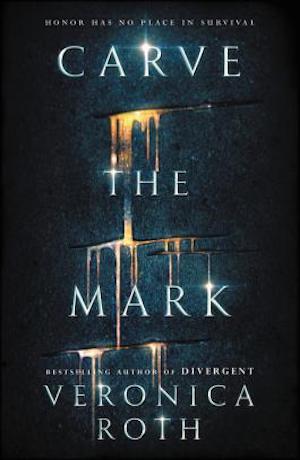
Some people are gifted with magical abilities in the world of Carve the Mark, but Cyra Novak would not describe her ability as a “gift.” Her power is chronic pain—and she has the ability to transfer it to others by touch. Her brother is the tyrant leader of the Shotet people and uses Cyra to torture prisoners.
Cyra is an incredibly strong fighter and trains every day—something, I’ll admit, I scoffed at a little because I know how exhausting chronic pain is, and the toll it takes on your body. I had a hard time believing she would be so physically fit and wouldn’t just lie in bed some, if not most, days. But what I did relate to was her guilt: Cyra feels like she deserves her pain. Throughout this series and the relationships she builds, Cyra works through these emotions and strives to make peace with a condition that threatens to swallow up her life.
Cinder by Marissa Meyer
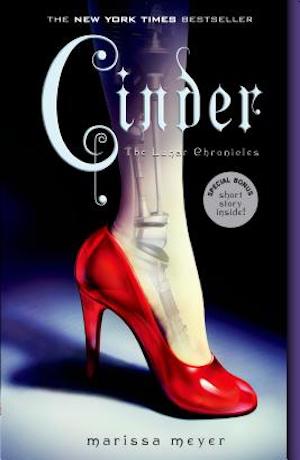
Cinder is a cyborg in a futuristic fairy tale where cyborgs are second-class citizens. Without basic human rights, they are experimented on and considered disposable simply because their bodies are different. Cinder also lives in poverty, a common reality for people with disabilities and conditions. Throughout most of the story, she has to deal with a limp because her stepmother won’t let her buy a foot that fits her better than her child-sized prosthesis. But mostly, her condition is “invisible,” and she tries to hide her cyborg identity from the prince because she’s afraid he will not want to associate with her if he knew the truth.
I love that Cinder doesn’t fall into stereotypes: she is a talented mechanic, clever, stubborn, and determined to escape those who hold power over her. Cinder explores the stigmas that come with being disabled in a culture that pressures people to conform to able-bodied standards. Her story is about coming to terms with her identity and valuing herself despite a society that says she’s worthless.
Allison Alexander edits sci-fi and fantasy at a small press, writes books, and plays video games the rest of the time. She is the incurable author of Super Sick: Making Peace with Chronic Illness, a geek’s guide to living with a disability. You can find her chasing bokoblins in Hyrule, traipsing with hobbits in Middle-earth, or blogging at aealexander.com.










